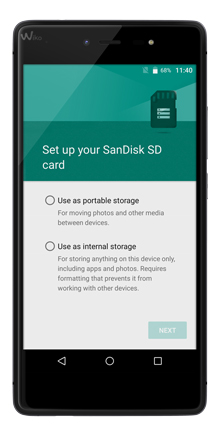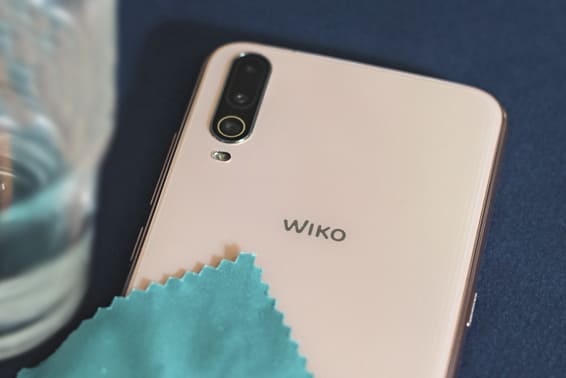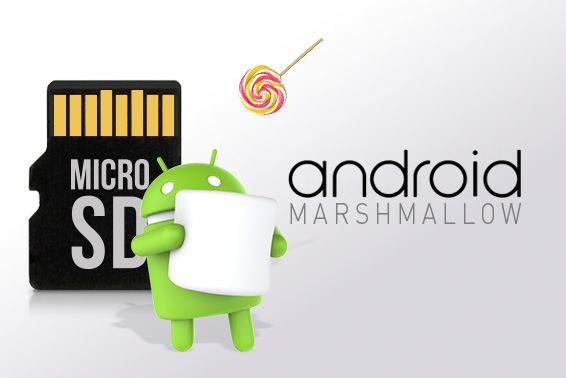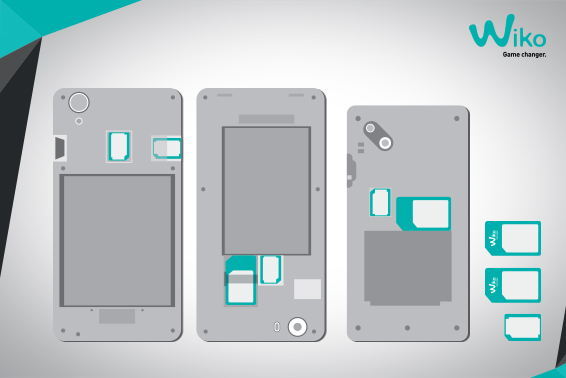You have been using a SD card with your Wiko powered by Android™ Lollipop. Going to Android™ Marshmallow entails a few changes regarding SD card management.
A notification appears in the taskbar "New SD card detected" in the following cases:
- at the moment of Android™ Marshmallow update,
- if you insert this SD card into another Wiko powered by Android™ Marshmallow.
At the opening of this notification, the following message is displayed:

The selected option can delete your apps or make them disabled.
In order to prevent any loss of data and optimize your SD card operation, Wiko proposes the procedures below before updating or changing your smartphone.
- Option 1: "Use as portable storage"
Your apps saved on the SD card are deleted irreversibly.
Transferring the apps from the smartphone to the SD card or adding new ones is not possible anymore.
- Option 2: "Use as internal storage"
This operation merges the memory of the SD card with the smartphone (ROM).
The SD card is automatically reset:
- files and apps are deleted,
- it becomes exclusively associated with your Wiko phone.
After this operation, files and apps can be shared again between the smartphone and the SD card.
Android™ Marshmallow system manages automatically the location of files and apps according to their size (± 150 Mo) and the available memory space. However, it is possible to replace them manually.
Here are the prior procedures to follow :
Import contacts from the SD card to the smartphone or a Gmail account
Open "contacts" app :

• tap on 
• tap on "Import/export"
• select "SD card"
• tap on "NEXT"
• select a Gmail account or "Phone storage"
• tap on "NEXT"
• select "vCard files"
• tap "Ok" to save
Transferring contacts can take a few minutes according to their volume.
Backup the files of the SD card (pictures, video or audio) using a PC
Plug the smartphone to the USB port of the PC :
• swipe the smartphone taskbar downward
• tap on "Choose a type of connection" or tap on "Connected as..."
• select "Media device (MTP)" if needed
• on the PC, open the blinking Windows explorer
• click on "Open device" to view files, then open the volume "Phone storage"
• double-click on "SD card" folder
• copy/paste or drag and drop the files from the SD card to the phone or to the PC.*
*Path to the SD card:
Pictures & videos: SD card\DCIM\Camera or Pictures
Audio (downloads): Phone's name\SD card\Download
*Path to the phone:
Pictures & videos : Phone's name\Phone storage\DCIM\Camera
Transfer photo and video files from a SD card to the smartphone
Open "File Manager" app:

• tap on "File"
• select "SD card"<
• in "DCIM" folder, select "Camera"
• hold on a file for a few seconds
• check the box of the files to transfer or select all
• tap on "Move"
• tap on "Root"
• select "Phone storage"
• select a destination folder
• tap on "Paste".
Transfer the apps from the SD card to the phone storage
Open "Settings" app :

• tap on "Apps"
• tap on "SD card" thumbnail
• select the app to transfer
• tap on "MOVE TO INTERNAL STORAGE".
Save data on a Gmail account
Open "Settings" app :

• tap on "Backup & reset"
• enable "Back up my data"
• set backup account
• enable "Automatic restore" if you have a lot of apps to process.










